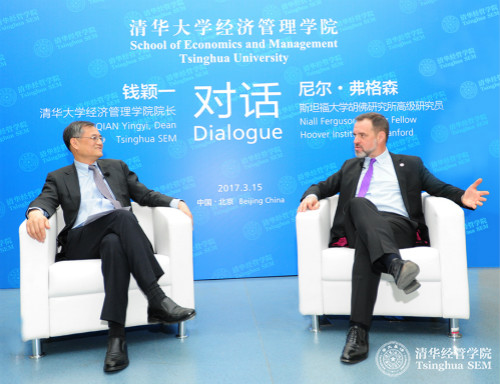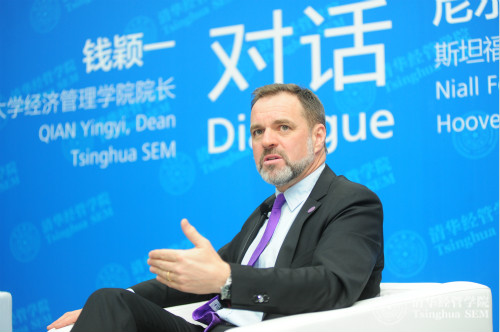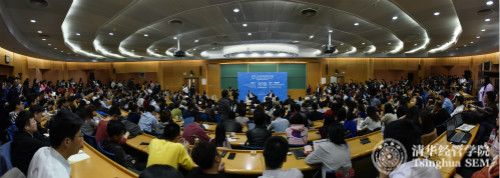On March 15, 2017, Professor QIAN Yingyi, Dean of Tsinghua University School of Economics and Management (Tsinghua SEM) held an insightful two-hour long dialogue with Niall Ferguson, renowned historian, senior fellow of the Hoover Institution, Stanford and Distinguished Visiting Professor at Tsinghua SEM, on the topic of "Trumpworld? The Consequences of the 2016 U.S. Election for Economic Globalization and International Order.”
Dean QIAN initiated the dialogue with current topics of Brexit, U.S. Elections and discussions into the impact of Trump’s Presidency on economic globalization and development of the world economy, as well as the consequences and changes brought about by his new political and economic policies towards China and the World.

Tsinghua SEM Dean QIAN Yingyi dialogue with world renowned historian Professor Niall Ferguson
Placing Brexit and Trump’s Presidency in a common context of the financial crisis
Dean QIAN started off the dialogue by introducing Professor Ferguson as a historian specializing in the research of globalization and world order, and invited him to share his insights on the key events of the past 20 years from a historical perspective, especially regarding Brexit and Trump’s Presidency and the contexts and interconnections of the two events. Professor Ferguson pointed out that he had foreseen in as early as 2009 that the financial crisis would ultimately have profound geopolitical consequences, in terms of populist backlash that will significantly shift political ground in Europe and North America and escalate conflicts like those in the Muslim world. Both the voting results of the U.S. election and Brexit happened under this context. According to Professor Ferguson, British voters would have opted for the status quo if not for the EU’s failure to cope with the financial and refugee crisis, which arose from the Syrian war. American voters, similarly, felt disillusioned with the way the American political establishment had handled the two crises, alongside a significant disconnect between elites and the real people and their discontent towards economic and cultural globalization which ultimately resulted in Trump’s presidential victory.
The dual possibility of economic boom and recession in Trump’s era
Leading the topic of expectations for the future, Dean QIAN then discussed in detail the Trump’s administration and its economic policy. Professor Ferguson stated that the Trump administration’s new economic policies are focused in the areas of tax reform, healthcare reform and deregulation, but Trump and his policies are still at the mercy of congressional politics despite his strong personality. He then gave two predictions with regards to the US macroeconomy – firstly, the Trump’s administration is paying a lot of attention to infrastructural investment, along with measure such as Reagan-like supply side stimulus of deregulation and tax reform, could result in a short term volatility but a long term boom. And secondly, lack of synchronization in actual implementation and big shifts in market sentiment could also result in the recession first, growth later pattern of Reagan’s presidency.

Niall Ferguson, world renowned historian, senior fellow of the Hoover Institution, Stanford and Distinguished Visiting Professor at Tsinghua SEM
Distributional inequalities amidst common benefits of economic globalization
Professor Ferguson also shared his thoughts on the impact of the Trump’s administration on economic globalization from two aspects. First, he pointed out that the era of globalization helped to catapult China to the second largest economy in the world, and it would not have happened if not for free trade regimes allowing capital flows into and out of china, making China the largest beneficiary. He argued that this is the reason why the Trump’s government is trying to change the rules. Dean QIAN stated that fundamental economic principles tell us that globalization and trade benefits everyone. However, he observes that there are huge distributional differences implications in both countries. Professor Ferguson replied that these differences allow him to see where anti-globalization sentiment is coming from, but he sincerely hoped that the administration can come to the negotiating table with China and realize the mutual benefits mentioned by Dean QIAN.

Dialogue between Tsinghua SEM Dean QIAN Yingyi and Professor Niall Ferguson
Lastly in Q&A, students raised questions such as whether US companies were moving back to the states, if the decomposition of EU is doomed, the role of media in Trump’s election, and Trump’s bilateral and multilateral negotiation principles, to which Professor Ferguson gave insightful answers. (by WU Tong)
 Latest News
Latest News